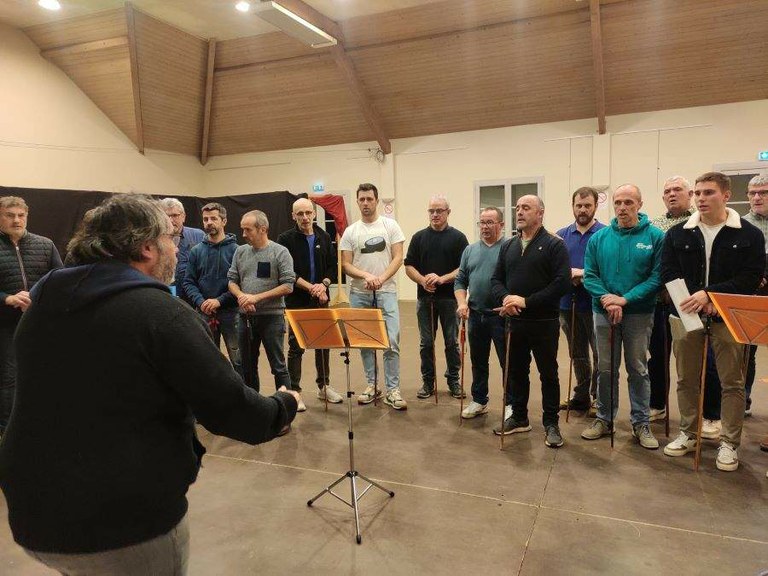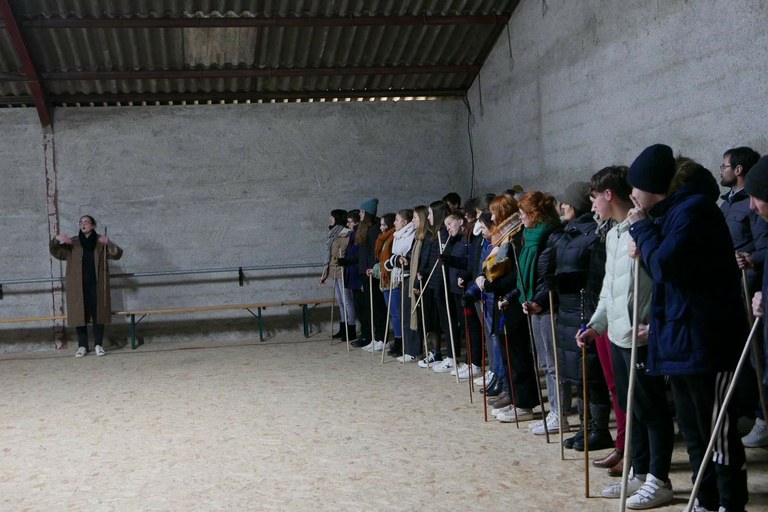
- This year will be fruitful in pastoralists with four pastoralists, two in Zuberoa and two outside Zuberoa: Pamplona (Navarra) and Xarwinter area (Laburdi-Nafarroa Beherea). Four stories of our people will be made known onstage through theater, dance, music and coplas.

It is clear that in Zuberoa this genre with centuries of history is alive. It is observed that it is a good tool for social cohesion; in pastoral women, citizens meet, focusing on dance, music and Euskera, and they know and disseminate the life and history of several people. In addition to Zuberoa, its attractiveness and functioning in other parts of the Basque Country stand out.
Matalaz, cure the rebels
Bernard Goihenetxe “Matalaz” (Mithikile, ? - Lextarre, 1661), pastoral about the priest to celebrate the 30th anniversary of coral Oilarrak. In 1661 Zuberoa led the peasant rebellion against the nobility and the bourgeoisie of Maule. The farmers of Zuberoa fought against the troops sent by the king of France. After losing the battle, Matala and her relatives were arrested and taken to Maule Castle. He died cut in Matalaz Lextarre Square.
The pastoral Matalaz of Etxahun Iruri was presented in Eskiula in 1955 and these texts have been played by the singers of the Oilarrak group and the musicians of the Musikalde group, Battitta Berrogain. The pastoral Matalaz will be seen on 23 March in Urdiñarbe, 6 April in Mitikil and 13 April in Baigorri.

Julia Fernández Zabaleta, progressive teacher and abertzale
In Pamplona the pastoral Julia Fernández Zabaleta (1898 – 1961) is being prepared. He was born in Pamplona and studied there his teaching studies with a scholarship that allowed him to study in Barcelona with the prestigious Italian pedagogue María Montessori. In her life, the promotion of Basque and Basque culture, the struggle for women’s rights and the work carried out in pedagogical renewal stand out. He chaired the Basque Women's Assembly in Pamplona. In 1936 he was dismissed from his masterpieces for political reasons and was exiled for years. He died in Pamplona in 1961.
This small pastoral is the dynamic initiated a couple of years ago by the group of singers of the Association of the Horse of Pamplona.La pastoral led by Ihitz Iriarte will be presented in a small format and simple setting. The preparation of this file and testimonies have been carried out by Mikel Taberna and Kike Díez Ulzurrun testuaz.Pastoral, in which information has been collected about Julián Fernández Zabaleta, which has so far been quite in the shadow, and will now be shown to the public on 4 and 12 May in Pamplona.
Inesa Gaxen, a witch who was saved from the flames
Today the pastoral ministry on Inesa Gaxeni will be announced (Labastida, 1566 - Lapurdi, 17th century). He was accused of witchcraft in Gax and twice imprisoned for witchcraft. He was tried in the Bordeaux parliament at the age of eighteen and released. In 1611, some children, along with other women, declare a witch and welcome him back. The judgments of Hondarribia left the case in the hands of the Inquisition of Logroño, which, although not expected, left without charge. Many inhabitants of Hondarribia did not accept the sentence and finally left Inesa Gax and other women on the border with Hendaia.
Nine towns of Xarnegu and surrounding areas met in June to pastoral. The proposal came from the hand of Pantxika Urruti, pastoral director, and to materialize the idea they created the Xarnegu Pastorala association, which brings together some 15 members of the area. The population works in Labastida (NB), Ahurti (L), Erango (NB), Bardoze (L), Burgüeñ-Erreiti (NB), Bidaxune (NB), Akamarre (NB), Gixune (L) and Samatzeko (NB).
The area of Xarnegu is a geographic region of Lapurdi and Baja Navarra, characterized by its historically bilingual nature, the Basque country has lived with occitan gas cón for centuries. Therefore, in the pastoral ministry the Basque will be mixed with the gas field, Itxaro Borda has written the pastoral ministry in Euskera, and there are fragments in the gas field of Sergi Javaloyes. On 15 and 16 June it will be issued in Labastida and on 21 and 22 September in Bardoz.

Life of brothers Ligetx
The inhabitants of Gamere-Zihiga prepare the pastoral 'Ligetx koblakaria(k)'. The representation is dedicated to the life of Luis Ligetx (Larraine 1901 - Zihiga 1940), a pastoral cloblaster. He was born in Larrain, but married Zihigara. He also worked as a grower, as a cooblator and writer. He was a professor at Etxahun Iruri. Etxebeste saw that there were few women’s positions and proposed giving prominence to Luis’s sister. It will therefore also work as a cooblacea on the table. To do so, not having much information about her sister in files and papers, they add a little bit of fiction.
About eighty Gamere-Zihiga residents work for this Sulatvian pastoral care. The text has been written by Beñat Larrori and Xantiana Etxebest acts as director or regenta. It will be represented in Gamere-Zihiga on 28 July and 3 August.
Pastoralists 2024
- 23 March, Saturday, Urdiñarbe (Z): Matalaz
- Saturday, 6 April, Mitikile (Z): Matalaz
- Saturday, 13 April, Baigorri (NB): Matalaz
- 4 May, Saturday, Pamplona (N): Julia Fernández Zabaleta
- 12 May, Sunday, Pamplona (N): Julia Fernández Zabaleta
- 15 June, Saturday, Labastida (BN): Inese in Gax
- 16 June, Sunday, Labastida (BN): Inese in Gax
- Sunday, 28 July, Gamere-Zihiga (Z): Player/s ligetx
- August 3, Saturday, Gamere-Zihiga(Z): Player/s ligetx
- 21 September, Saturday, Bardoze (L): Inese in Gax
- 22 September, Sunday, Bardoze (L): Inese in Gax